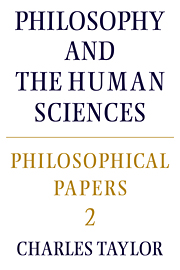Book contents
3 - Social theory as practice
Published online by Cambridge University Press: 05 June 2012
Summary
In this chapter and the next, I want to argue that we could gain a great deal by examining our theorizing about social matters as a practice. My claim is that the activities of searching for, creating, espousing and rejecting theories are too little understood, and that they are far from being unproblematic, as we often assume in our concern to focus on the content of our theories.
Moreover, I want to maintain that gaining clarity about the practice of theorizing will help us to understand more about the scope and validity of our theories. Being more reflectively clear about what we do in our theoretical activity will help us to answer questions which we cannot even properly pose as long as we remain convinced that social theory is a straightforward matter of designing hypotheses and comparing them to the facts.
In particular, I hope to throw light on two important questions in what follows. The first concerns how we validate social theories. The second starts from the answer to the first and asks what is involved in offering a theoretical account of societies very different from our own.
What makes the whole matter appear unproblematical to us is the hold of what I want to call the natural science model, the widespread view that the natural sciences can provide us with paradigms for the methods and procedures of social science. We think we understand the activity of exploring nature. Here, too, we are certainly over-complacent.
- Type
- Chapter
- Information
- Philosophical Papers , pp. 91 - 115Publisher: Cambridge University PressPrint publication year: 1985
- 34
- Cited by



